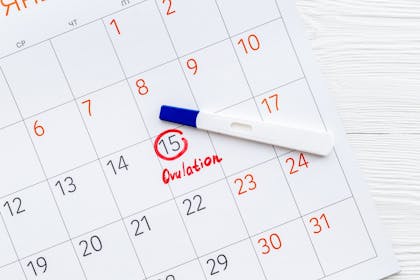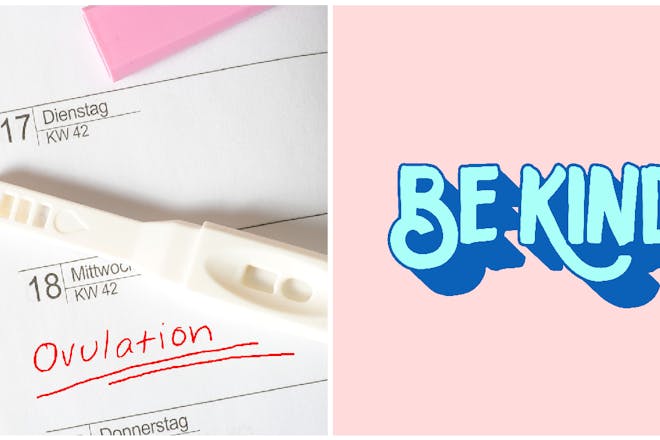9DPO: pregnancy symptoms and testing at nine days post ovulation

Which symptoms you can expect at 9dpo? Is it the right time yet to take a pregnancy test? Here's everything you need to know about what to expect at nine days post ovulation.
You've probably already heard the term ‘days post ovulation’ or 'dpo'. If you haven’t, it’s exactly how it sounds: how many days have gone by since you ovulated.
On average, ovulation usually happens roughly two weeks (between 10 to 16 days) before your next period, according to the NHS. You can keep track of you ovulation in a few different ways, like checking your cervical mucus, charting your basal body temperature, or using a tool like our online ovulation calculator. If you want to learn more, you can check out our article about how ovulation works.
We’ve gone through all the research from the NHS, Healthline, and other experts, so if you already know that you’re nine days past ovulation (9dpo), and you’re wanting to get the low-down on what to expect, read on!
FREE NEWBORN NAPPIES
What’s happening in my body at 9dpo?
We can’t tell you exactly what’s happing in your body, because it can depend on a lot of different factors, from how long and how regular your menstrual cycles are, to the last time you had sex.
Even so, once you reach 9dpo, it’s possible that:
- an egg has been released from your ovary, but made it through your fallopian tube without being fertilised (you’re not pregnant)
- an egg has been released from your ovary, met a sperm and was fertilised, but hasn’t yet implanted (you may or may not be pregnant)
- an egg has been released from your ovary, was fertilised, and has now implanted in your womb (you’re pregnant)
Here’s how the whole thing happens:
On the day that you ovulate, your ovary releases an egg and it starts to travel down the fallopian tube on its way towards your womb. If it meets a sperm on its 24-hour long journey it might well be fertilised. If not, then it will leave your body when you have your next period.

Sperm can survive in your body for up to five days after they arrive, which means if you’ve had sex within a few days before you ovulate or within 24 hours after, then the egg might be fertilised before it reaches the womb.
If that happens, then once it makes it to the womb, the egg might implant into your uterus. Implantation normally happens between 6 – 12 days past ovulation, so at 9dpo you’re right in the middle of this timeframe, though there’s still a few days for it to happen if it hasn’t yet.
If the egg implants, then your body will start to produce human chorionic gonadotropin (hCG), also called the pregnancy hormone. This is what pregnancy tests are looking for, though it can take around 7-12 days for hCG to build up to levels that will give a positive result.
That means that from around 13dpo you’ve got a better chance of an accurate result on your pregnancy test, which is about when you’d normally expect your next period to start. Early pregnancy symptoms like nausea, fatigue, and sore breasts are also caused by the hCG build-up in your body.
What symptoms might I experience at 9dpo?
Generally, you’re not likely to experience pregnancy symptoms at 9dpo, but some mothers-to-be do notice some mild symptoms start to show up if the egg has already implanted. That said, not having symptoms doesn’t mean you aren’t pregnant, or that it won’t happen this time. And to make things even harder to predict, some of the symptoms are quite similar to pre-menstrual symptoms.
Because it’s still so early on, even if the egg has implanted there’s a good chance that your hCG levels haven’t risen high enough to give you symptoms. Even so, according to the NHS you might start to experience these early pregnancy symptoms:
- nausea or vomiting
- tender or sore breasts
- fatigue
- peeing more than usual
- unusual cravings
- smells and tastes being more intense or unpleasant
Learn more about the early signs of pregnancy.
What do other Netmums experience?
You’re not the only one going through this. Here’s what some of the members of the Netmums community have shared about their TTC journey:
‘I'm 9DPO, thought heck it I’ll test for the fun of it! BFN (of course). I know it's still early so trying not to think too much about it. But have any of you had BFPs at 9DPO? Thanks ladies (the TWW truly sucks).’
- Anon (later updated to say she was not pregnant)
‘I OV’ed last Monday, had smiley face on Clearblue OV test and had the OV pains too. We BD'ed 3 times on the right dates. I had some cramps at 6dpo.
Yesterday evening I felt really sickly after dinner and although I was really hungry at 4pm by the time I sat down to eat at 5, I could only manage half my dinner. Same thing today, I feel sickly when I’m hungry, then only managed half my lunch and feel sickly again now. My boobs have been very sore since 2dpo, with tingling sensation since 6dpo. I've got loads of spots and my skin is really greasy too, not something I usually suffer with. I also think that my sense of smell is much higher, but that could just be in my head of course... I tested this morning against better judgement as I’m only on 9dpo, and of course it was negative, used a cheapy test from BabyMad.’
- Anon (later updated to say she had a positive pregnancy test)
‘I'm 9dpo today and this TWW is killing me! Is there anyone in the same boat as me?
Think I'll test with a cheapie at 11dpo (Thurs). AF due Friday. Had a few symptoms from days 1-7 (well aware it's probably progesterone related!) but now feel nothing apart from super dry mouth in the mornings and had a tiny gum bleed this morning and sat. Also having really bad nightmares and vivid dreams for the past 5 nights.
This is my first time TTC, would be first baby and first cycle. I know the odds but can't stop getting my hopes up for this cycle...’
- Antrim (later updates suggest she was not pregnant)
‘These are my symptoms. As you can see got a BFP on day 11. Perhaps try to test again in a few days time. It certainly sound like pregnancy symptoms to me.
- 1 & 2 dpo - no symptoms
- 3, 4 & 5 dpo - tired, tender breasts, hungry
- 6 dpo - lower back pain, hungry, tired, moody and impatient
- 7 dpo - tired, lower back pain, cramp in leg, very moody and tearful
- 8 dpo - bloated, v. tired, right leg cramp, cold symptoms, period pains. v. moody, weepy and angry
- 9 dpo - tender breasts, nauseous and queasy, tired,
- 10 dpo - tired, cold symptoms, nauseous and queasy
- 11 dpo - tired, tender breasts, nauseous and queasy, clear blue p. Test - positive!’
- Anon
‘My S/O and I have been TTC for would originally been 1 year and half but then I found out I had ovarian cyst which have now been removed (5 months ago) the past 2 months have been confusing 2 months ago I had a lot of symptoms including nausea fatigue, a lot more cm but then got my period , and then last month was very confusing I had them all and my period was 10 days late now this month I’m currently 9dpo and this is my list of symptoms:
- Constant sore nipples can’t even really touch them
- Spouts of nausea (including vomiting)
- Bloated feeling
- Dull like period cramps along both ovaries since 5dpo
- Cravings for donuts and raw noodles
- Only confusing thing is I’m pretty dry down there (tmi!!!)’
- Dreammum19 (later updates suggest she was not pregnant)
‘I’m 9dpo today and all last night since about 1:30am I had the most awful cramps, mostly right around where AF cramps are but the occasional one spread up towards my tummy.
I’ve not had pains like it before they were like contractions the came on slow then got worse to the point I felt a bit worried then eased off!! *until the next came ☹️☹️ Has anybody any idea what it could have been??...they’ve gone now and I’m just feeling exhausted, I thought maybe I needed the toilet but doesn’t seem so and I’m not due AF for 5 days and never ever have had this??
- Mummy_moo (later updated to say she had a positive pregnancy test)
Can I take a pregnancy test at 9dpo?
Generally, it’s not worth taking a pregnancy test yet, as even if an egg has implanted your hCG levels are unlikely to have built up to a detectable level. You could end up having a false negative, which can be really disheartening.
According to the NHS, it’s best to wait to take a test until the day your period would normally start, which usually falls around 14dpo if your menstrual cycle takes the average 28 days. That’s because it takes around a couple of weeks for your body to produce enough hCG for the average test to detect.
Highly sensitive tests can sometimes give you a result before your period is due, with 9dpo being the start of when they can work. They’re more likely to give you an accurate result the longer you wait though, so don’t be put off if you’re still getting a BFN at this stage.
Learn more about when to take a pregnancy test.
How can I get through the TWW?
The dreaded Two-Week Wait can be a nail-biting time, and the days can seem to drag as you wait until it’s finally a good time to take a test. First and foremost, you need to remember to be kind to yourself.
It’s perfectly normal for you to be obsessing over your symptoms, many mums-to-be have been in your shoes. Try to distract yourself with activities you enjoy, like reading a new page-turner, digging in to that TV show you’ve been meaning to watch, or hitting a new high-score on your favourite mobile game.
Try to remember that the longer you wait, the more likely it is that you’ll get an accurate pregnancy test result, so try to push on for a few more days if you can. If you can’t hold off, and don’t get the BFP that you’re hoping for, try not to worry; at this early a stage, it doesn’t mean it’s not going to happen!
If you need a sympathetic ear, you can always share your symptoms on the Netmums Forum with other hopeful parents, and keep track of your progress with other mums at a similar stage in one of the Trying to Conceive Clubs. We've also got some more tips to help you to survive the TTW.
More on DPO
If you want to keep an eye on your potential pregnancy symptoms and what's going in your body on each day post ovulation, check out our articles from day 1 to 19:
1DPO • 2DPO.• 3DPO • 4DPO • 5DPO • 6DPO • 7DPO • 8DPO • 9DPO • 10DPO • 11DPO • 12DPO • 13DPO • 14DPO • 15DPO • 16DPO • 17DPO • 18DPO • 19DPO





